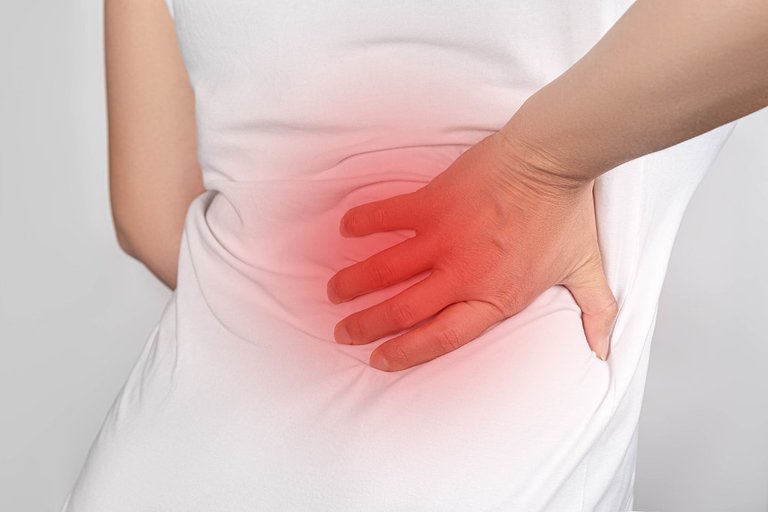I grew up seeing my sister go through intense pain whenever it was that time of the month, she would literally roll and cry and my Dad would put her head on his lap while he pats her back, and oh because I love my sister so much I would cry alongside sometimes, I always wonder why anyone would have to go through such pain just because they are having their monthly cycle. As she got older, the pain reduced and she started to get better. I don't know what happened again, but lately, she complained about the symptoms coming right back, but I don't cry alongside her anymore, the last time I visited her carried her on my back to make her feel better(lol), my sister can be a baby during that time of the month, and I love her so much, as a matter of fact, I wish I could be with her at those periods of the month, but it is not possible.

(Image taken with my mobile phone)
She was even telling me a story of a worst-case scenario, she said this lady would be unable to go out all through the menstrual period, and sometimes she would even faint and get rushed to the hospital. My heart goes out to all ladies who go through this monthly cycle of pain, I know it is not a pleasant thing to happen to any lady. I have always tried to imagine the reason why these beautiful ladies have to go through this intense pain, but here I am trying to write about the reason behind menstrual cramps.

pexels.com
Menstrual cramps are also known as dysmenorrhea, it is a throbbing or cramping pain often felt in the lower abdominal region, so many women experience menstrual cramps before and during their menstrual cycle, the nature of pain felt, varies amongst women, for some women it is merely an annoying discomfort and for others, it is a type of severe pain felt on a regular. The pain is caused by uterine contractions that occur previously or during the start of your period. Menstrual cramps are usually accompanied by other symptoms; dizziness, fatigue, nausea, stooling, and others.
During a menstrual period, the uterus normally contracts in order to help shed lining, the contractions are triggered through hormone-like substances known as prostaglandins, the higher the level of prostaglandins, the more severe the menstrual cramp would be. Some people would normally have menstrual cramps without any underlying health issues and for some others, there are underlying health issues behind the pain. Let's check through what some of the medical conditions that can trigger intense menstrual pain could be;
Polycystic Ovary Syndrome (PCOS): A common hormone disorder that affects a little percentage of women in their childbearing age, when a woman has PCOS, it comes with these symptoms; prolonged menstrual periods, heavy periods, fast weight gain and difficulty loosing weight, acne, hair loss, dark skin patches, excessive facial and body hair.
Endometriosis: This is a chronic but non-cancerous health condition, with this condition, the cells that look like a uterus lining, called endometrial cells, grow outside the uterus. With the presence of endometriosis, pelvic pain is a common symptom but is accompanied by other symptoms like; heavy menstrual periods, painful sexual intercourse, difficulty getting pregnant, gastrointestinal pain, painful bowel movement, and menstrual periods that go longer than 7 days.

flickr.com
Pelvic Inflammatory Disease(PID): PID is a bacterial infection of the female reproductive organ, PID Is often caused by sexually transmitted infections (STIs), like gonorrhea, chlamydia, and others. Other symptoms associated with PID are; fever, painful urination, foul-smelling vagina, bleeding during or after sexual intercourse and spotting in between periods.
Fibroids: Fibroids are growths, that are non-cancerous and that grow inside or outside of the uterus. It is possible to have more than one fibroid symptom even without symptoms, but there could be symptoms depending on the location and size of the fibroid. Severe menstrual cramps could be a sign of fibroids, but there are also other signs; leg pain, heavy periodic flow, constipation, lower back pain, menstrual pain that would last more than a week, and even constant urination that could be painful.
Cervical stenosis: Also known as the closed cervix, happens when the opening of your cervix is closed narrowly or completely, there is a possibility of being born with cervical stenosis or having it developed later on. When the cervix is closed, menstrual blood could be prevented from leaving the body, making your period really light and irregular, it could also create fertility problems.
Adenomyosis: This happens when the endometrial tissue that lines the uterus grows into the muscles of the uterus, adenomyosis is typically a thickening of the uterus. With adenomyosis, the tissue continues to function as it would normally function all through the cycle, that is, thickening, breaking down, and leaving the body, this causes the uterus to grow into two to three times its regular size.
Intrauterine Device (IUD): IUD is a small-sized birth control device inserted into your uterus, there are different types of IUDs, some of these IUDs contains hormones while others are hormone-free. The IUD'S are safe for a lot of people, but could also occasionally cause certain side effects like; irregular periods, serious menstrual cramps and heavy menstrual bleeding.
If your menstrual cramp isn't beyond normal and it is not caused by any underlying medical issue, then you can get the pain relief through one of the following means;
Exercise: Doing aerobic exercise for about 30 minutes at least three times in a week will help reduce how severe the menstural crap could get.
Heating pad: There have been confirmed cases of the heating pad being as effective as a strong pain relief, so placing a hating pad on the lower abdominal region could provide a strong relief.
Stress: The intense level of stress some ladies put their body through could worsen menstrual cramps, take sometime to engage in yoga, breathing activities and other activities that could help you calm your stress level.
Supplements: There are good supplements that can help you reduce how severe the menstrual cramps are.
Pain relieves: Over the counter pain relief does so much in helping to relieve the pain and symptoms felt during mensturation.
You should definitely see a doctor when your menstural cramp;
- Disturbs your lifestyle every month.
- The symptoms felt gets even worse on a monthly basis.
- You suddenly begin to have menstural cramps after the age of 25.
Conclusion.
You must understand that, your menstural cramp is getting out of hand if you are unable to either go to work or go to school because you are on your period, when simple relief medications and routines won't help you feel better, a doctor will help in ruling out any underlying condition especially the one that requires immediate treatment.
Hello, a very important issue for us women, I used to have very painful episodes in terms of my period, you certainly mention causes that we should keep in mind, today there are many methods to improve these processes and these days of intense pain.
Greetings, good topic.
Gladly there are, and medical improvements to help with complicated conditions too.
Thanks for your contribution to the STEMsocial community. Feel free to join us on discord to get to know the rest of us!
Please consider delegating to the @stemsocial account (85% of the curation rewards are returned).
You may also include @stemsocial as a beneficiary of the rewards of this post to get a stronger support.